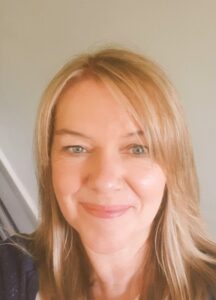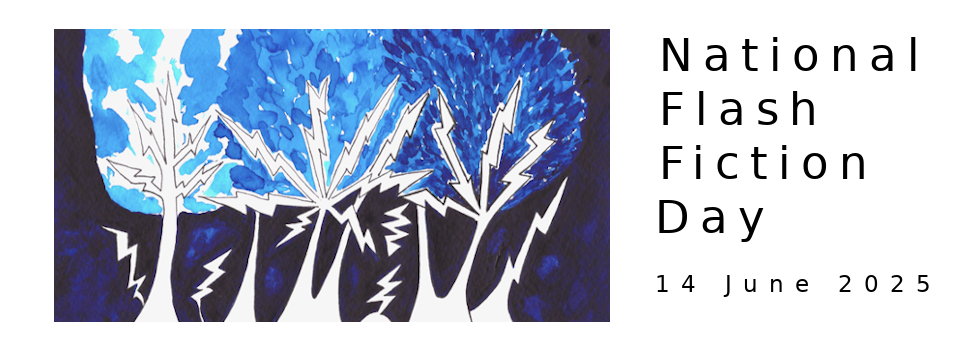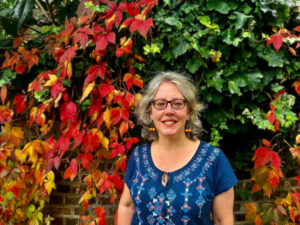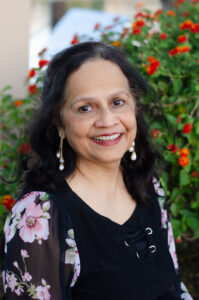Welcome to the fifth instalment in our series of interviews with this year's National Flash Fiction Day Anthology Editors and Microfiction Competition Judges! Submissions for the Anthology and Microfiction Competition are open until 15 February 2025.
This week, NFFD's Diane Simmons chats with National Flash Fiction Day's Karen Jones who is co-editing the 2025 anthology alongside this year's guest editor, Cheryl Markosky. They discuss humour, inspirations, and Karen's top tip for those approaching themed submission calls....
 DS: This is your fourth year of co-editing the NFFD anthology and it’s been brilliant having you on the team. I know you always have lots of advice for people writing flash, whether it be 100 words, 500 words or longer, but if you had to pick only one piece of advice for writers, based on your experience of reading so many themed anthology submissions, what would it be?
DS: This is your fourth year of co-editing the NFFD anthology and it’s been brilliant having you on the team. I know you always have lots of advice for people writing flash, whether it be 100 words, 500 words or longer, but if you had to pick only one piece of advice for writers, based on your experience of reading so many themed anthology submissions, what would it be?
KJ: Strive for originality. Themes tend to lead people down familiar paths, so we’ll get lots of stories on the most obvious subjects connected to the theme. Try to do something different, something only you could write. I often suggest making a list of the first words that come into your mind when you see a theme – then delete them and start again, digging deeper, going in directions others may not have considered.
DS: There is a great deal of humour in your work. Are there any flash fictions that you remember made you laugh out loud?
KJ: Debra A Daniel tends to crack me up. I loved this one at Bath Flash Fiction: Grand Canyon Official Form 477D. Oh, and Damhnait Monaghan’s 'And We Lived Happily Ever After', which was the title story for our 2022 anthology, is a superb example of humour.
DS: Have you always written fiction? If not, can you remember what inspired you to start?
KJ: I dabbled in poetry, briefly, but, yes, almost always fiction. I wrote short stories even when I was at school. I’ve always been an avid reader and always a daydreamer, so there were always stories in my head. I started writing with a view to actually submitting work when my sons were small and I was a full-time carer for my mother, so I was at home most of the time – it was a kind of escape from the realities of the day.
DS: Were you a reader as a child? If so, did you have a favourite author?
KJ: Yeah, I always had at least one book on the go. I was obsessed with a Scottish writer called Ruth M. Arthur. Her books had a supernatural edge to them and I loved that at the time. Unfortunately, they are no longer in print. I wish I could read them now and find out if they really were that good.
DS: Is there a flash fiction writer who has influenced your own writing? Or one who you particularly admire?
KJ: Not influenced as such – unless we count creative writing teachers who’ve helped along the way, in particular that would be Kathy Fish. But admire, yes, lots. Off the top of my head I’d say Sharon Telfer, Fiona MacKintosh, Sara Hills, Elisabeth Ingram Wallace and Tracey Slaughter. I’ve never read anything other than excellence from them and they make me want to be a better writer.
Karen Jones is a flash and short fiction writer from Glasgow, Scotland. Her flashes have been nominated for Best of the Net and The Pushcart Prize, and her story Small Mercies was included in Best Small Fictions 2019. She has won first prize in the Cambridge Flash Prize, Flash 500 and Reflex Fiction and second prize in Fractured Lit’s Micro Fiction Competition. Her work has been Highly Commended/shortlisted for To Hull and Back, Bath Flash Fiction, Bath Short Story Award and many others. Her first novella-in-flash When It’s Not Called Making Love is published by Ad Hoc Fiction, and her second, Burn It All Down, is published by Arroyo Seco Press. She is an editor for National Flash Fiction Day anthology.



